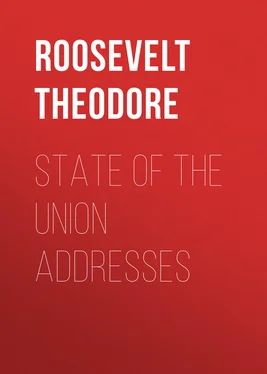Theodore Roosevelt - State of the Union Addresses
Здесь есть возможность читать онлайн «Theodore Roosevelt - State of the Union Addresses» — ознакомительный отрывок электронной книги совершенно бесплатно, а после прочтения отрывка купить полную версию. В некоторых случаях можно слушать аудио, скачать через торрент в формате fb2 и присутствует краткое содержание. Жанр: foreign_edu, Технические науки, Политика, на английском языке. Описание произведения, (предисловие) а так же отзывы посетителей доступны на портале библиотеки ЛибКат.
- Название:State of the Union Addresses
- Автор:
- Жанр:
- Год:неизвестен
- ISBN:нет данных
- Рейтинг книги:5 / 5. Голосов: 1
-
Избранное:Добавить в избранное
- Отзывы:
-
Ваша оценка:
- 100
- 1
- 2
- 3
- 4
- 5
State of the Union Addresses: краткое содержание, описание и аннотация
Предлагаем к чтению аннотацию, описание, краткое содержание или предисловие (зависит от того, что написал сам автор книги «State of the Union Addresses»). Если вы не нашли необходимую информацию о книге — напишите в комментариях, мы постараемся отыскать её.
State of the Union Addresses — читать онлайн ознакомительный отрывок
Ниже представлен текст книги, разбитый по страницам. Система сохранения места последней прочитанной страницы, позволяет с удобством читать онлайн бесплатно книгу «State of the Union Addresses», без необходимости каждый раз заново искать на чём Вы остановились. Поставьте закладку, и сможете в любой момент перейти на страницу, на которой закончили чтение.
Интервал:
Закладка:
The Congress has not heretofore made any appropriation for the better enforcement of the antitrust law as it now stands. Very much has been done by the Department of Justice in securing the enforcement of this law, but much more could be done if the Congress would make a special appropriation for this purpose, to be expended under the direction of the Attorney-General.
One proposition advocated has been the reduction of the tariff as a means of reaching the evils of the trusts which fall within the category I have described. Not merely would this be wholly ineffective, but the diversion of our efforts in such a direction would mean the abandonment of all intelligent attempt to do away with these evils. Many of the largest corporations, many of those which should certainly be included in any proper scheme of regulation, would not be affected in the slightest degree by a change in the tariff, save as such change interfered with the general prosperity of the country. The only relation of the tariff to big corporations as a whole is that the tariff makes manufactures profitable, and the tariff remedy proposed would be in effect simply to make manufactures unprofitable. To remove the tariff as a punitive measure directed against trusts would inevitably result in ruin to the weaker competitors who are struggling against them. Our aim should be not by unwise tariff changes to give foreign products the advantage over domestic products, but by proper regulation to give domestic competition a fair chance; and this end can not be reached by any tariff changes which would affect unfavorably all domestic competitors, good and bad alike. The question of regulation of the trusts stands apart from the question of tariff revision.
Stability of economic policy must always be the prime economic need of this country. This stability should not be fossilization. The country has acquiesced in the wisdom of the protective-tariff principle. It is exceedingly undesirable that this system should be destroyed or that there should be violent and radical changes therein. Our past experience shows that great prosperity in this country has always come under a protective tariff; and that the country can not prosper under fitful tariff changes at short intervals. Moreover, if the tariff laws as a whole work well, and if business has prospered under them and is prospering, it is better to endure for a time slight inconveniences and inequalities in some schedules than to upset business by too quick and too radical changes. It is most earnestly to be wished that we could treat the tariff from the standpoint solely of our business needs. It is, perhaps, too much to hope that partisanship may be entirely excluded from consideration of the subject, but at least it can be made secondary to the business interests of the country–that is, to the interests of our people as a whole. Unquestionably these business interests will best be served if together with fixity of principle as regards the tariff we combine a system which will permit us from time to time to make the necessary reapplication of the principle to the shifting national needs. We must take scrupulous care that the reapplication shall be made in such a way that it will not amount to a dislocation of our system, the mere threat of which (not to speak of the performance) would produce paralysis in the business energies of the community. The first consideration in making these changes would, of course, be to preserve the principle which underlies our whole tariff system–that is, the principle of putting American business interests at least on a full equality with interests abroad, and of always allowing a sufficient rate of duty to more than cover the difference between the labor cost here and abroad. The well-being of the wage-worker, like the well-being of the tiller of the soil, should be treated as an essential in shaping our whole economic policy. There must never be any change which will jeopardize the standard of comfort, the standard of wages of the American wage-worker.
One way in which the readjustment sought can be reached is by reciprocity treaties. It is greatly to be desired that such treaties may be adopted. They can be used to widen our markets and to give a greater field for the activities of our producers on the one hand, and on the other hand to secure in practical shape the lowering of duties when they are no longer needed for protection among our own people, or when the minimum of damage done may be disregarded for the sake of the maximum of good accomplished. If it prove impossible to ratify the pending treaties, and if there seem to be no warrant for the endeavor to execute others, or to amend the pending treaties so that they can be ratified, then the same end–to secure reciprocity–should be met by direct legislation.
Wherever the tariff conditions are such that a needed change can not with advantage be made by the application of the reciprocity idea, then it can be made outright by a lowering of duties on a given product. If possible, such change should be made only after the fullest consideration by practical experts, who should approach the subject from a business standpoint, having in view both the particular interests affected and the commercial well-being of the people as a whole. The machinery for providing such careful investigation can readily be supplied. The executive department has already at its disposal methods of collecting facts and figures; and if the Congress desires additional consideration to that which will be given the subject by its own committees, then a commission of business experts can be appointed whose duty it should be to recommend action by the Congress after a deliberate and scientific examination of the various schedules as they are affected by the changed and changing conditions. The unhurried and unbiased report of this commission would show what changes should be made in the various schedules, and how far these changes could go without also changing the great prosperity which this country is now enjoying, or upsetting its fixed economic policy.
The cases in which the tariff can produce a monopoly are so few as to constitute an inconsiderable factor in the question; but of course if in any case it be found that a given rate of duty does promote a monopoly which works ill, no protectionist would object to such reduction of the duty as would equalize competition.
In my judgment, the tariff on anthracite coal should be removed, and anthracite put actually, where it now is nominally, on the free list. This would have no effect at all save in crises; but in crises it might be of service to the people.
Interest rates are a potent factor in business activity, and in order that these rates may be equalized to meet the varying needs of the seasons and of widely separated communities, and to prevent the recurrence of financial stringencies which injuriously affect legitimate business, it is necessary that there should be an element of elasticity in our monetary system. Banks are the natural servants of commerce, and upon them should be placed, as far as practicable, the burden of furnishing and maintaining a circulation adequate to supply the needs of our diversified industries and of our domestic and foreign commerce; and the issue of this should be so regulated that a sufficient supply should be always available for the business interests of the country.
It would be both unwise and unnecessary at this time to attempt to reconstruct our financial system, which has been the growth of a century; but some additional legislation is, I think, desirable. The mere outline of any plan sufficiently comprehensive to meet these requirements would transgress the appropriate limits of this communication. It is suggested, however, that all future legislation on the subject should be with the view of encouraging the use of such instrumentalities as will automatically supply every legitimate demand of productive industries and of commerce, not only in the amount, but in the character of circulation; and of making all kinds of money interchangeable, and, at the will of the holder, convertible into the established gold standard.
Читать дальшеИнтервал:
Закладка:
Похожие книги на «State of the Union Addresses»
Представляем Вашему вниманию похожие книги на «State of the Union Addresses» списком для выбора. Мы отобрали схожую по названию и смыслу литературу в надежде предоставить читателям больше вариантов отыскать новые, интересные, ещё непрочитанные произведения.
Обсуждение, отзывы о книге «State of the Union Addresses» и просто собственные мнения читателей. Оставьте ваши комментарии, напишите, что Вы думаете о произведении, его смысле или главных героях. Укажите что конкретно понравилось, а что нет, и почему Вы так считаете.












